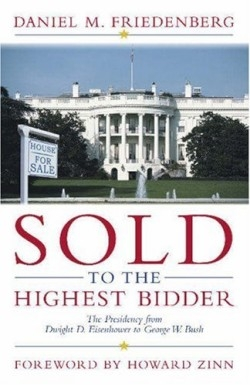Sold to the Highest Bidder
The Presidency from Dwight D. Eisenhower to George W. Bush
Apathy, cynicism, and low voter turnout are the responses of the American public to its money-driven elections, which result in the rule of the rich over the middle and lower classes, claims the author, a former feature writer for the New York Herald Tribune who also wrote Life, Liberty, and the Pursuit of Land. The United States has become more a plutocracy than a democracy, governed by such political dynasties as the Stevensons, Harrimans, Kennedys, and Lodges. Friedenberg devotes most of his book to “mad-as-hell” summaries of the presidencies of the last fifty years: he makes little effort to mask his anger for the sellout of ideals and programs for the money needed to buy votes.
To Friedenberg, President Kennedy was “a playboy with an orgiastic sex drive… which made Bill Clinton… seem like a Vestal Virgin.” Jimmy Carter was “a redneck racist,” who, according to fellow Georgian politician Julian Bond, “was one of the phoniest men I ever met.” Presidents Johnson, Nixon, Ford and George H. W. Bush receive similar hostile treatment.
The chapters on Reagan and Clinton are the most provocative. Reagan is rightly faulted for the rampant political corruption that characterized his two terms. He is, however, lauded for keeping at bay the right wing of the Republican Party, which was hostile to Soviet President Gorbachev’s efforts to move the USSR to a capitalist economy. President Clinton, whose sixties values and friendships with many African-Americans riled his most powerful enemies—who were themselves no shining examples of virtue—is portrayed sympathetically. President George W. Bush is viewed before September 11, 200l as a spoiled lightweight.
The author presents several reforms—none new—that he believes will drain the electoral swamp. These include the elimination of unaccountable streams of soft money; replacing the Electoral College with a direct presidential election; modernizing election mechanics to avoid a repeat of the 2000 fiasco; term limits for presidents, members of Congress and Supreme Court justices; and establishing an independent oversight committee, which can compel elected officials to testify about political, but not personal, issues.
Various political scholars and journalists have previously investigated Friedenberg’s proposals. He does, however, argue them persuasively with examples from the most recent elections.
Reviewed by
Karl Helicher
Disclosure: This article is not an endorsement, but a review. The publisher of this book provided free copies of the book to have their book reviewed by a professional reviewer. No fee was paid by the publisher for this review. Foreword Reviews only recommends books that we love. Foreword Magazine, Inc. is disclosing this in accordance with the Federal Trade Commission’s 16 CFR, Part 255.

